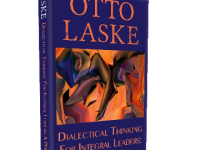This blog introduces the new IDM Program for learning complexity thinking based on critical problems brought forward by the client. Client-proposed problems serve as a procedural and behavioral guideline for a 5-step acquisition of cutting-edge solution approaches that have been tested in previous IDM teaching and are grounded in Roy Bhaskar’s work on dialectic (1993). In contrast to earlier IDM offerings, the present one progresses in clear steps from module to module to facilitate learner progress. Emphasis in the course is put on “doing” over passive listening. Lecturing is kept to a minimum. A progressive sequence of mandatory "meta-thinking" exercises is in place. The program comprises 5 steps taking 9 months to 1 year to complete, depending on the learner’s present level of cognitive development and mental habits. It concludes with three successively higher-level certifications in complexity thinking for use in life and work. Course materials are module-specific and are enriched by IDM publications on sale at www.interdevelopmentals.org under Publications, or taken from recent blogs by Otto Laske. A discount applies to registering for 4 of the 5 modules upfront, after writing to otto@interdevelopmentals.org to discuss the learner's agenda. In coming months, the program will move from its present test-phase... Read More...
Category: Distance Learning Course
Einladung an deutsche Berater und Coach ihre berufliche Praxis höherzuschrauben
Warum nicht mit alten Vorurteilen brechen die aus der positivistischen Tradition stammen und alle im Flachland landen? Dazu ist im Zeitalter des distributed leadership mehr Anlass als je. Die alten Kompetenzschablonen sind tot, und nun wie weiter? Vielleicht hülfe es, sich zu erinnern dass Menschen sich ihr ganzes Leben lang entwickeln? Das würde auf die Erwahcsenenforschungen führen, die in diesem Buch von Otto Laske (übersetzt von Rainer v. Leoprechting 2010) dazu verwandt werden, neue Einsichten und Werkzeuge in die Weisen des Umgangs mit ‘human resources’ einzuführen. Das Buch zeigt die Stufen der lebenslangen Entwicklung der persönlichen Erfahrungen, die jeder in seiner Arbeit und seinem Leben macht, und die zu stets grösserer innerer Freiheit und Selbständigkeit führen. Das Buch gibt dazu neue Werkzeuge an die Hand und zeigt auch, wie man über die Verwandlung der Arbeit durch neue, z. B. holakratische Umgebunglen, nachdenken sollte. Humanpotenziale erkennen, wecken, und messen: Pay Pal Dazu Weiteres auf: Gateway auf deutsch Read More...
Invitation pour les consultants et coach français de renouveller leur profession
Comment les consultants et coach francais peuvent-ils renouveller leur profession utilisant le CDF (Constructive Developmental Framework)? https://www.paypal.com/webapps/hermes?token=5MN6985866069092K&useraction=commit&mfid=1488977403882_1d069d5a8c123#/checkout/login C’est là la question qui se pose se livre sur la découverte du potential humain, allant plus loin que les abstractions des sciences sociales contemporaines. En recherchant de nouvelles clefs pour l’engagement de l’adulte dans le processus de développement (non seulement dans les organizations commerciales), ce livre ouvre la voie a l’évolution du professional aussi bien que de l’être humain. C’est un livre important pour tous les professionnels qui accompagnent les adultes dans leur croissance et la réalisatin de leur potential, introduisant a la fois une perception profonde des “clients” ainsi qu’une réflexion sur soi-même. Dans cette facon, le livre peut induire chez soi une transformation profonde de son être, donnant un nouvel élan dans sa vie professionnelle ainsi que privée. Vour pourrez réévaluer tout ce que vous avez appris jusqu’a maintenant d’un point de vue tres personnel, et aurez l’opportunité d’analyser votre propre développement. Programme Francais CDF Philips-Laske 2009 Read More...
Contributions to Evidence Based Developmental Coaching
This article describes a constructivist approach to coaching based on the Constructive Developmental Framework (CDF). Such coaching is evidence based, i.e., based on empirical assessments of coachees prior to actual coaching. Coaching plans are based on empirical findings about coachees' present frame of reference (the way they see the world), meant to guide them toward a more lucid understanding of themselves and their work, and toward more complex thinking. The article appeared in the International Review of Coaching Psychology, London, UK, in 2007, and is here reprinted because it helps behavioral coaches understand the limitations of their professional work. Contributions of Evidence Based Coaching 2007 Read More...
What is CDF: An Introduction for Beginners
This article introduces to the Constructive Developmental Framework (CDF), addressing those readers who want to learn to use the methodology. CDF is seen as a comprehensive framework for consulting and coaching, much like NLP, but on a higher level of consciousness. Its main intellectual strength lies in establishing a methodology for the deconstruction, through dialog, of less developed thinking and meaning making, for the sake of client benefit. Viewed more broadly, CDF is a framework for “coaching for society” that can lift individuals’ and teams’ developmental level. What is CDF -- An Introduction for Beginners Read More...
DIALECTIC IS GOOD FOR BUSINESS: IT HELPS TO BEFRIEND IT
It so happens that not only is the world in unceasing transformation, but the human mind (which is part of it) has been given invaluable tools to deal with it. I am referring to the “four moments of dialectic” philosopher Roy Bhaskar taught us, as well as to Basseches' and my own work on dialectical thought forms since the year 1997. In courses at the Interdevelopmental Institute, I have shown since 2000 that the four moments of dialectic equally show up in human thinking, whether manifest in speaking or writing. I daresay this could be a key for living in this rapidly changing world a little more prepared what is coming toward us. How could you make a start in dialectic? Well, as philosophers have always taught us, you need to start with yourself. It isn’t hard, but it takes an effort. Living in a language-suffused world as we do, you could start with what you hear yourself saying when you speak and consider how the four moments of dialectic inform your thinking that is being expressed through concepts. You will find that as soon as you open your mouth you have already placed yourself into one of the four... Read More...

